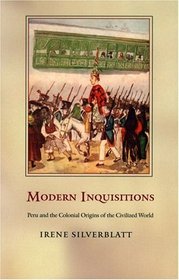Search -
Modern Inquisitions: Peru And The Colonial Origins Of The Civilized World (Latin America Otherwise)
Modern Inquisitions Peru And The Colonial Origins Of The Civilized World - Latin America Otherwise
Author:
Trying to understand how "civilized" people could embrace fascism, Hannah Arendt searched for a precedent in modern Western history. She found it in nineteenth-century colonialism, with its mix of bureaucratic rule, racial superiority, and appeals to rationality. Modern Inquisitions takes Arendt’s insights about the barbaric underside of We... more »
Author:
Trying to understand how "civilized" people could embrace fascism, Hannah Arendt searched for a precedent in modern Western history. She found it in nineteenth-century colonialism, with its mix of bureaucratic rule, racial superiority, and appeals to rationality. Modern Inquisitions takes Arendt’s insights about the barbaric underside of We... more »
ISBN-13: 9780822334170
ISBN-10: 0822334178
Publication Date: 10/2004
Pages: 299
Rating: ?
ISBN-10: 0822334178
Publication Date: 10/2004
Pages: 299
Rating: ?
0 stars, based on 0 rating
Publisher: Duke University Press
Book Type: Paperback
Members Wishing: 0
Reviews: Amazon | Write a Review
Book Type: Paperback
Members Wishing: 0
Reviews: Amazon | Write a Review
Genres:
- History >> Americas >> South America >> Peru
- Religion & Spirituality >> Religious Studies >> History
- Nonfiction >> Social Sciences >> Anthropology >> Cultural
- Nonfiction >> Social Sciences >> Sociology >> General




